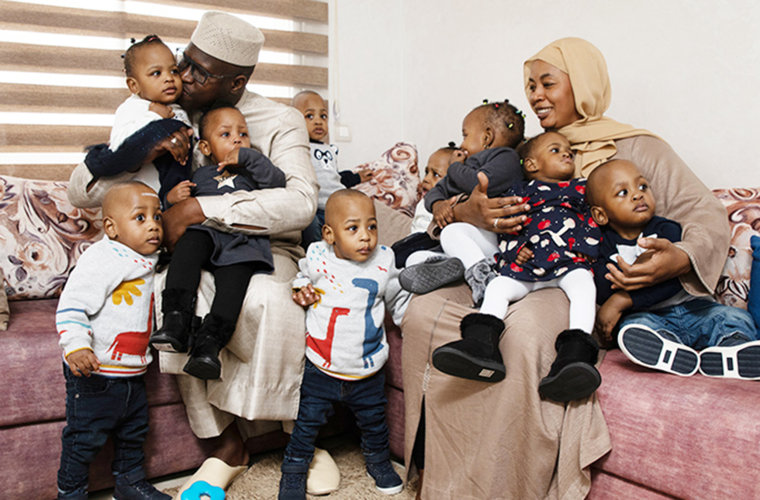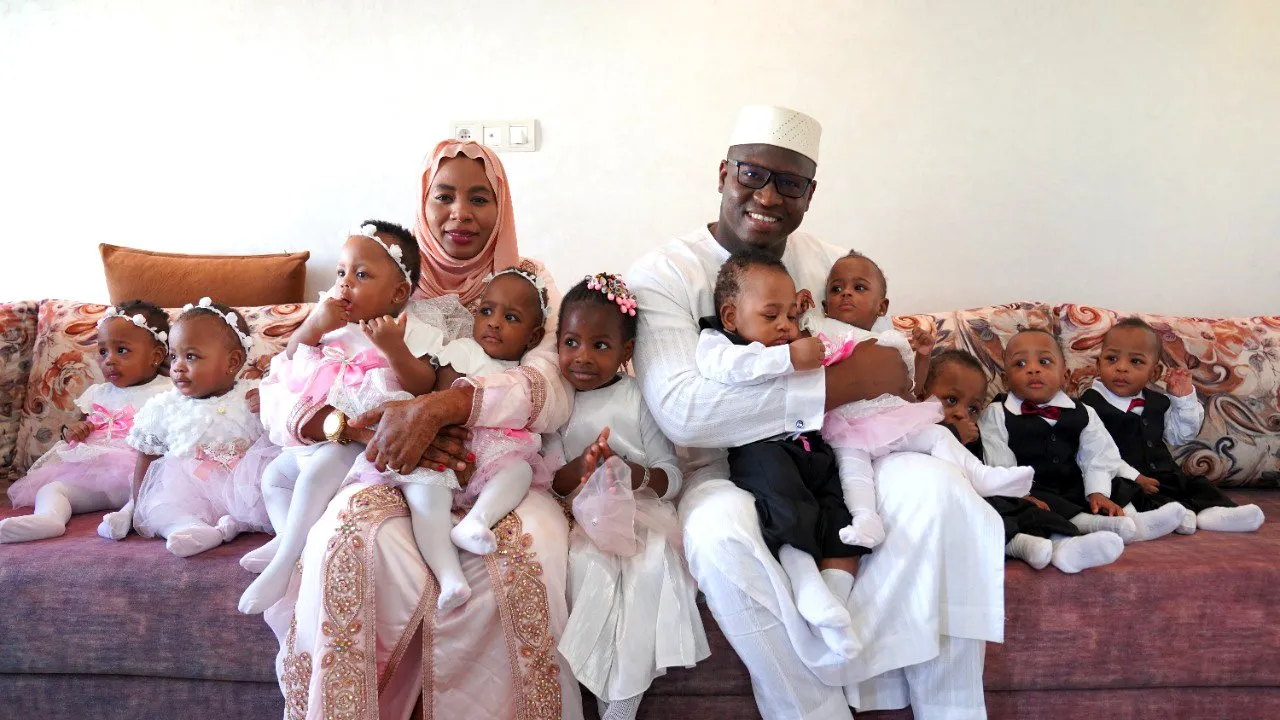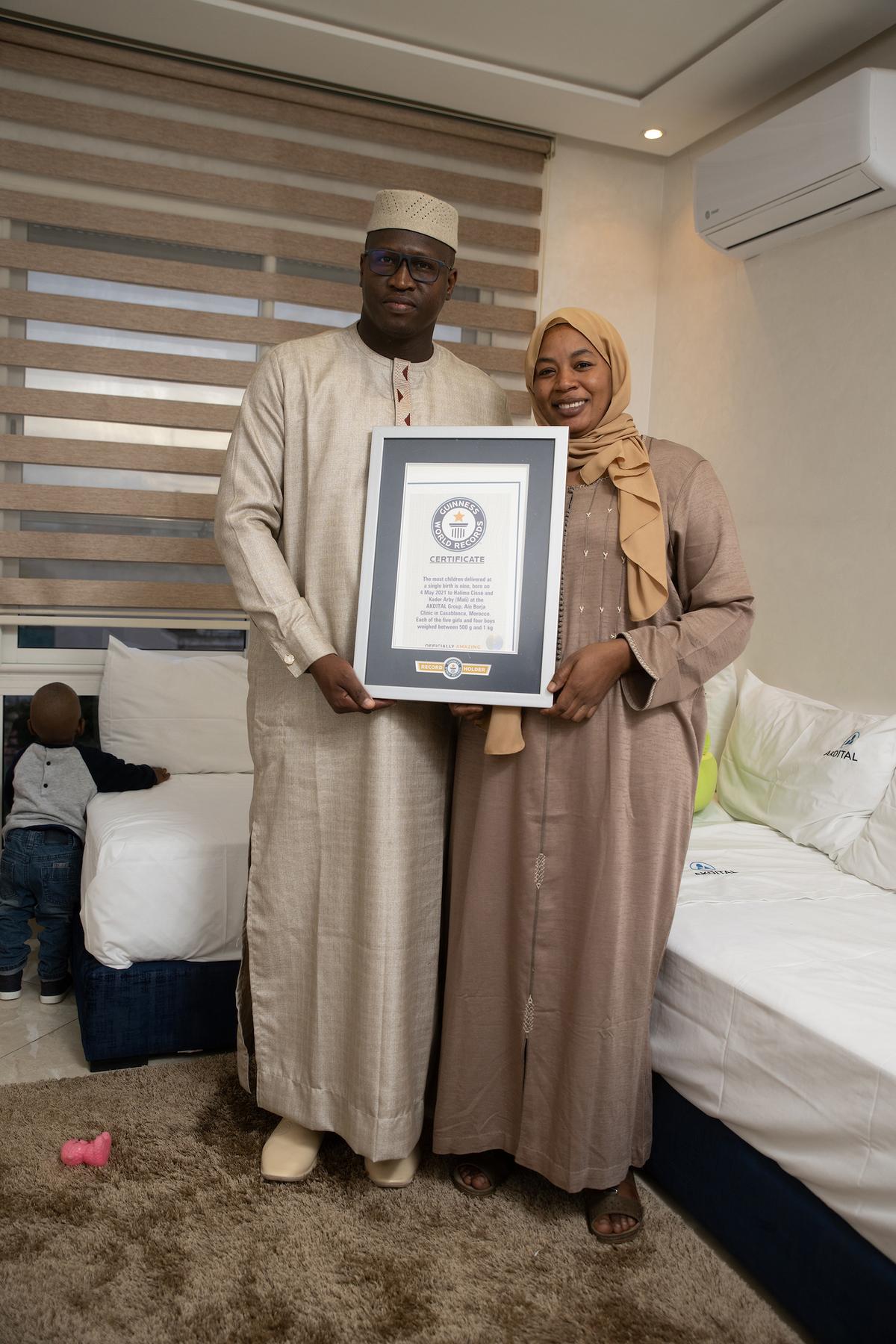The Unbelievable Birth of Nine: Halima Cissé’s Story of Strength, Science, and Survival
The Unbelievable Birth of Nine: Halima Cissé’s Story of Strength, Science, and Survival
In the world of modern medicine, few events can truly be called miracles. But on May 4, 2021, Halima Cissé, a young woman from Mali, forever etched her name in medical history by giving birth to nine healthy babies in a single delivery. Her case shocked, amazed, and inspired people across the globe. It wasn’t just a record-breaking moment; it was a testament to the power of science, the endurance of the human body, and the boundless strength of a mother.
Halima’s journey began like any other pregnancy. Living in the West African country of Mali, she and her husband were expecting their second child. But very early in the pregnancy, Halima began to experience unusual discomfort and rapid physical changes. An ultrasound scan revealed something astonishing: she was carrying seven babies. Such cases are known as high-order multiple pregnancies and are extremely rare, with risks that are not only high for the babies, but potentially life-threatening for the mother as well.

Fearing the limitations of Mali’s medical infrastructure, the government decided to send Halima to Morocco for advanced maternal care. She was transferred to Ain Borja Clinic in Casablanca, where a highly specialized team of doctors and nurses closely monitored her around the clock. As her belly grew beyond imagination, so did the risks: premature labor, organ failure, internal bleeding, and the immense physical strain of supporting nine developing fetuses.
Against all odds, Halima carried her pregnancy to 30 weeks. On May 4th, 2021, she underwent a carefully planned Cesarean section. The result? Five girls and four boys, all born alive and healthy. The team of over 30 medical staff in the operating room successfully managed one of the most complex deliveries in the history of medicine. For comparison, the average pregnancy involves one baby and lasts 40 weeks. Halima carried nine for 30.

The children were immediately placed in neonatal intensive care, where they received round-the-clock monitoring. Each of them weighed between 500 grams and 1 kilogram at birth. The first few days were critical. Doctors feared infections, breathing complications, and underdeveloped organs. But slowly, day by day, they grew stronger.
Back home in Mali, the story dominated headlines. Halima became a symbol of hope, resilience, and courage. Her story wasn’t just about biology or medicine; it was about what the human spirit can endure when supported by love, community, and expert care. The Malian government not only supported her journey, but praised her for bringing joy and pride to the entire nation.

When the children were strong enough to be discharged, Halima and her husband faced another mountain to climb: raising nine children. But their challenge was met with overwhelming support. Charitable organizations, healthcare sponsors, and well-wishers from around the world offered help, supplies, and funding.
As the babies grew, the reality of raising nonuplets became more intense. Feeding schedules had to be organized down to the minute. Diaper changes were a near-constant cycle, and sleep became a rare luxury for the parents. The family required a team of helpers around the clock—volunteers, nurses, and extended relatives pitched in to provide structure to the chaos.
:max_bytes(150000):strip_icc():focal(500x343:502x345)/The-Mali-Nonuplets-070225-b92f49c342e34c949abf92ded0463bc7.jpg)
Yet despite the challenges, Halima remained the steady heart of the home. Her calm demeanor and unshakable love for her children created a nurturing environment. She often shared that while it was exhausting, each smile, each milestone—like a first tooth or first word—was worth all the sleepless nights.
The medical team that delivered the babies continued to monitor their development through regular check-ins. Developmental benchmarks such as weight gain, reflexes, and motor skills were closely watched. Though born premature, the babies showed impressive signs of catching up to their peers, defying early concerns about possible health complications.
Media outlets from around the world covered Halima’s story extensively. Documentaries were proposed. Interviews were broadcast. Halima and her children became global symbols of hope and possibility. The Guinness World Records officially recognized her as the mother of the most children delivered and surviving in a single birth.
In the months that followed, Halima used her platform to speak out about maternal health. She expressed gratitude for the care she received but also emphasized that many women do not have access to the same resources. Her advocacy sparked discussions about the disparities in maternal care between developed and developing nations. She became a quiet but powerful voice in the global conversation around women’s health.

As her nine children grew into toddlers, their personalities began to shine through. Some were more active, others more curious. They developed their own dynamics—mini friendships and rivalries that made every day a new adventure. Halima’s home, once a quiet place, became a symphony of laughter, footsteps, and the boundless energy of nine bright souls.
Community members organized fundraisers to support the family. Donations came in the form of food, baby supplies, toys, and even educational scholarships. Local businesses stepped forward with offers of transportation, clothing, and medical support. The village embraced the children as their own, creating a collective atmosphere of love and care.

The long-term plan for the nonuplets includes not just their health and happiness, but also their education. Plans are being developed to ensure they attend school together, receive personalized support, and have access to opportunities that reflect their unique beginning. There is even talk of establishing a foundation in their name, to help other families with high-order multiple births.
Halima’s story continues to unfold—one diaper, one milestone, one step at a time. Her journey speaks not only to the possibilities of modern medicine, but also to the spirit of resilience, hope, and the enduring power of motherhood. Few stories can unite the world in wonder, but hers did.

As the nonuplets approach their fourth birthday, their growth is a reminder of the miracle they represent. A miracle not just of science or survival—but of love. A love that carried them through risk and pain, through headlines and history, and into a life full of potential.
In a world often overwhelmed by difficulty, Halima Cissé’s nine children remain symbols of what’s possible when courage, care, and compassion come together. The world will not forget the day nine tiny lives arrived—and the mother who brought them into the world with silent strength and a heart full of hope.










